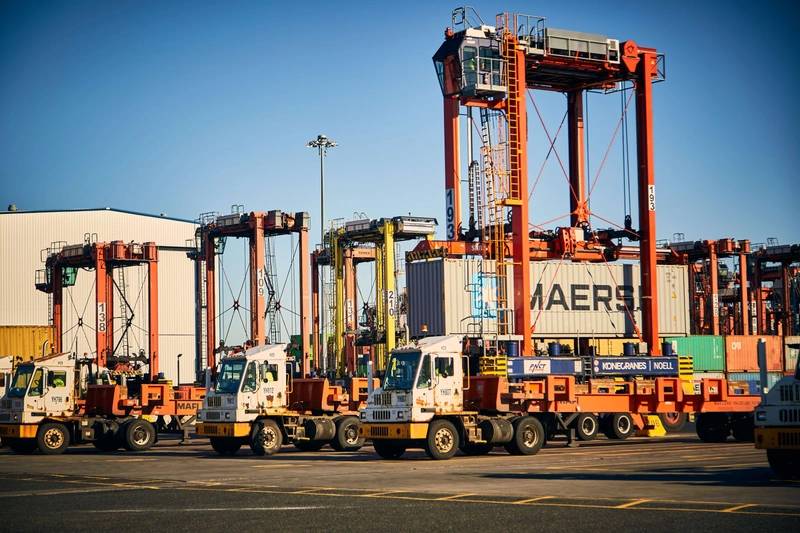Powering Ports with Alternative Energy Source: Propane
Powering Ports with Alternative Energy Source: Propane Maritime Logistics


Efficient and Reliable Power Supply for Port Operations

Efficient, reliable power supply is essential to port operations throughout the world. As research into off-shore energy and alternative fuels continues, it’s important to keep in mind the resources available now to provide prime and supplemental power for port operations. From portable generators and shore power to fleet vehicles, alternative energy sources like propane have the potential to power a variety of port applications.
Propane Power Generation
Whether planned or unplanned, power outages can happen at any time and ports can’t afford extended periods of downtime. By incorporating a variety of power generation options, port authorities can mitigate the effects of hazards beyond their control.
- Portable propane generators offer versatility in a port setting and can go wherever power is needed, whether or not an area is connected to the grid or another power source. Plus, propane won’t degrade over time like diesel or other fuels, ensuring generators are always ready for use.
- For a more permanent installation, propane standby generators provide power within seconds of a main power interruption and can handle a port’s energy needs for days, unlike solar or wind-powered systems, making it an ideal backup or prime option for shore power.
- Shore power provides power from the shoreline to a ship while docked, allowing ships to maintain fundamental vessel functions without running auxiliary engines and burning diesel fuel. Shore power is often connected to the grid but can also be powered by microgrids.
- A microgrid is a local energy grid with control capability, which means it can disconnect from the traditional grid and operate autonomously. Within microgrids are one or more kinds of distributed energy—solar panels, wind turbines, combined heat and power, and or, generators—that produce power during sudden or planned power outages. The quest for a more reliable, secure, and clean energy system is driving investment in microgrid technologies that can deliver superior reliability and resiliency for the nation’s aging and vulnerable grid.
Propane-Powered Port Vehicles
Propane can also efficiently and reliably power port vehicles. MAFI recently released its propane-powered port tractor that’s proven to match its diesel counterparts’ power output and last a full 8-hour shift without slowing down. With quick refueling, the propane-powered port tractor is able to continue operations while an electric port tractor requires 4-6 hours to fully recharge.
Not only can propane power port vehicles, it can reliably recharge electric vehicles. New innovations in electric vehicle charging utilize a propane-powered generator—in some cases along with wind and solar power—to recharge light-, medium- and heavy-duty vehicles, including forklifts and port tractors, independent of the electric grid. Additionally, solutions like Propane Fueling Solutions’ portable dual-purpose standalone fueling system allows fleets with various alternative fuel vehicles to refuel with propane autogas or recharge with DC level 3 fast chargers.
As innovations in alternative energy technology continue to advance, ports have the ability to achieve a more efficient and reliable future. With propane-powered grid technology and cargo handling equipment, port authorities can make significant steps toward those goals now.
SDGs, Targets, and Indicators
| SDGs | Targets | Indicators |
|---|---|---|
| SDG 7: Affordable and Clean Energy | 7.1 By 2030, ensure universal access to affordable, reliable, and modern energy services | Propane generators providing reliable power during outages |
| SDG 7: Affordable and Clean Energy | 7.2 By 2030, increase substantially the share of renewable energy in the global energy mix | Propane-powered port vehicles and alternative energy sources like wind and solar power for recharging electric vehicles |
| SDG 9: Industry, Innovation, and Infrastructure | 9.1 Develop quality, reliable, sustainable, and resilient infrastructure, including regional and transborder infrastructure, to support economic development and human well-being, with a focus on affordable and equitable access for all | Propane-powered generators and microgrids providing reliable power for port operations |
| SDG 11: Sustainable Cities and Communities | 11.6 By 2030, reduce the adverse per capita environmental impact of cities, including by paying special attention to air quality and municipal and other waste management | Propane-powered vehicles reducing air pollution in port areas |
1. Which SDGs are addressed or connected to the issues highlighted in the article?
The SDGs addressed or connected to the issues highlighted in the article are SDG 7: Affordable and Clean Energy, SDG 9: Industry, Innovation, and Infrastructure, and SDG 11: Sustainable Cities and Communities.
2. What specific targets under those SDGs can be identified based on the article’s content?
The specific targets under those SDGs that can be identified based on the article’s content are:
- Target 7.1: By 2030, ensure universal access to affordable, reliable, and modern energy services
- Target 7.2: By 2030, increase substantially the share of renewable energy in the global energy mix
- Target 9.1: Develop quality, reliable, sustainable, and resilient infrastructure, including regional and transborder infrastructure, to support economic development and human well-being, with a focus on affordable and equitable access for all
- Target 11.6: By 2030, reduce the adverse per capita environmental impact of cities, including by paying special attention to air quality and municipal and other waste management
3. Are there any indicators mentioned or implied in the article that can be used to measure progress towards the identified targets?
Yes, there are indicators mentioned or implied in the article that can be used to measure progress towards the identified targets. These indicators include:
- Propane generators providing reliable power during outages (Target 7.1)
- Propane-powered port vehicles and alternative energy sources like wind and solar power for recharging electric vehicles (Target 7.2)
- Propane-powered generators and microgrids providing reliable power for port operations (Target 9.1)
- Propane-powered vehicles reducing air pollution in port areas (Target 11.6)
4. Table: SDGs, Targets, and Indicators
| SDGs | Targets | Indicators |
|---|---|---|
| SDG 7: Affordable and Clean Energy | 7.1 By 2030, ensure universal access to affordable, reliable, and modern energy services | Propane generators providing reliable power during outages |
| SDG 7: Affordable and Clean Energy | 7.2 By 2030, increase substantially the share of renewable energy in the global energy mix | Propane-powered port vehicles and alternative energy sources like wind and solar power for recharging electric vehicles |
| SDG 9: Industry, Innovation, and Infrastructure | 9.1 Develop quality, reliable, sustainable, and resilient infrastructure, including regional and transborder infrastructure, to support economic development and human well-being, with a focus on affordable and equitable access for all | Propane-powered generators and microgrids providing reliable power for port operations |
| SDG 11: Sustainable Cities and Communities | 11.6 By 2030, reduce the adverse per capita environmental impact of cities, including by paying special attention to air quality and municipal and other waste management | Propane-powered vehicles reducing air pollution in port areas |
Behold! This splendid article springs forth from the wellspring of knowledge, shaped by a wondrous proprietary AI technology that delved into a vast ocean of data, illuminating the path towards the Sustainable Development Goals. Remember that all rights are reserved by SDG Investors LLC, empowering us to champion progress together.
Source: maritimeprofessional.com

Join us, as fellow seekers of change, on a transformative journey at https://sdgtalks.ai/welcome, where you can become a member and actively contribute to shaping a brighter future.







